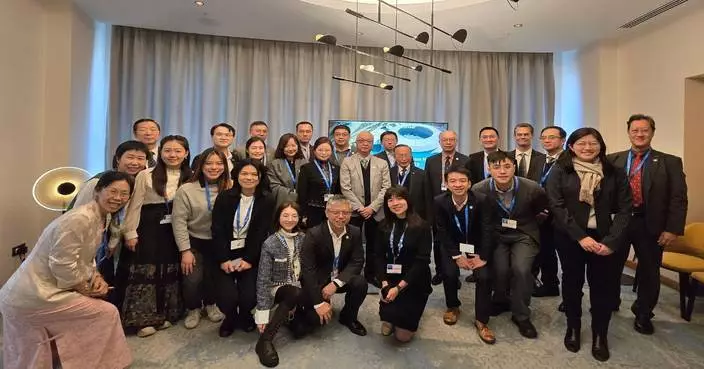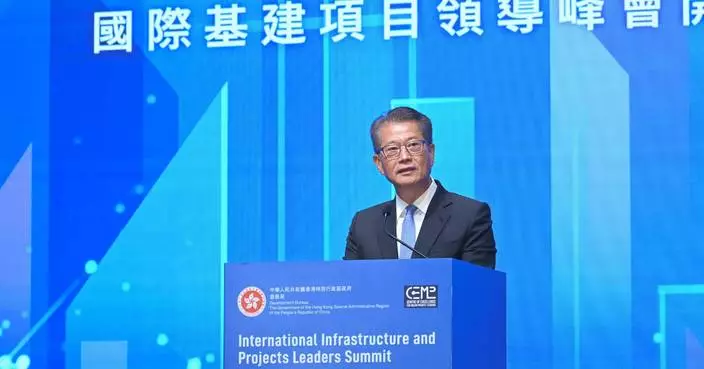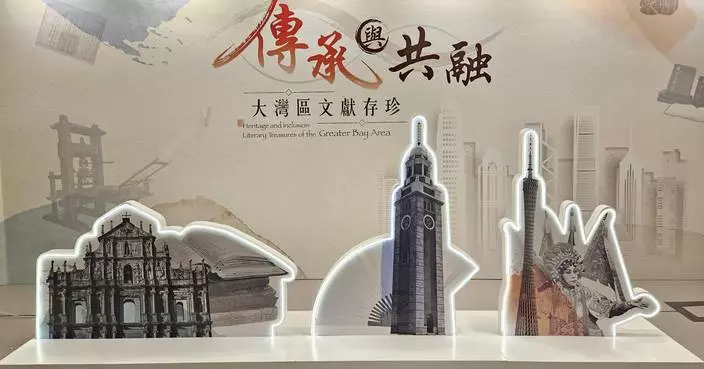Speech by SCED at plenary session of APEC Ministerial Meeting (2)
Following is the speech by the Secretary for Commerce and Economic Development, Mr Algernon Yau, at the plenary session themed "Sustainable growth for a resilient development" at the 35th Asia-Pacific Economic Cooperation (APEC) Ministerial Meeting in Lima, Peru, on November 14 (Lima time):
Thank you, Chair.
I would like to express our appreciation to Peru for its exemplary leadership in taking forward the sustainable development agenda this year. The adoption of the APEC Policy Guidance to Develop and Implement Clean and Low-carbon Hydrogen Policy Frameworks in the Asia-Pacific, as well as the Trujillo Principles for Preventing and Reducing Food Loss and Waste in the Asia-Pacific Region, is very timely, and once again demonstrates APEC's ability in formulating impactful yet pragmatic initiatives that address the environmental challenges of our time.
APEC should continue to take such collaborative spirit to implement these initiatives and advance other areas of co-operation, leveraging the strengths of the institution as well as those of member economies. On the sustainability agenda, Hong Kong, China (HKC) would like to highlight a few priority areas deserving our attention.
First, we should scale up finance and investment in innovation, research and development to support the transition to a green and low-carbon economy. As a leading green financing hub in Asia, HKC is committed to facilitating the transition in the region. Over the past three years, we issued and arranged an average of over US$63 billion in green bonds and debts annually. We have invested substantial resources in building a vibrant innovation and technology ecosystem, focusing on key sectors such as new energy and new materials. To foster cross-disciplinary collaboration, we have injected over US$50 million into the Green Tech Fund to provide funding support for research and development projects on decarbonisation technologies. In this connection, HKC recognises the significant progress made by APEC in sustainable finance and investment this year, in particular the launch of the Sustainable Finance Initiative under the APEC Finance Ministers' Process last month. We look forward to sharing our experiences and joining efforts in advancing this important work stream.
Second, we should leverage APEC as a premier platform for promoting capacity building to complement global efforts in addressing environmental challenges. HKC has launched the Strategy of Hydrogen Development domestically earlier this year with concrete actions to seize the opportunities brought about by the hydrogen economy, and is planning to host an APEC capacity building workshop on the application of hydrogen for land transport next year. We look forward to contributing further our experience and capacity-building efforts to the APEC process under the framework of the APEC Policy Guidance and relevant APEC fora.
Last but not least, we strongly believe that we should strengthen APEC's role as an incubator of ideas in developing solutions and pragmatic initiatives that contribute to our sustainability goals. APEC has long been a leader in fostering trade collaboration, particularly in facilitating and liberalising trade in environmental goods and services. Our efforts, most notably the APEC List of Environmental Goods and APEC Reference List of Environmental and Environmentally Related Services, have served as useful reference points in international discussions including in the World Trade Organization. HKC will remain a strong advocate for APEC's efforts on environmental goods and services, recognising their potential as a catalyst for accelerating the transition to a low-carbon economy through the power of trade.
As a leading regional economic forum, APEC is the ideal platform to facilitate international co-operation to promote the world's sustainable development. I would like to reaffirm HKC's commitment to collaborating with Peru and member economies to make APEC 2024 a resounding success.
Thank you.
CHP appeals to parents to arrange seasonal influenza vaccination for their children as soon as possible
The Centre for Health Protection (CHP) of the Department of Health (DH) today (November 15) appealed to parents again to arrange early seasonal influenza vaccination (SIV) for their children with a view to having better protection in the coming influenza season in winter.
The 2024/25 SIV Programmes started on September 26 this year. At present, around 970 kindergartens and child care centres (92 per cent), 630 primary schools (96 per cent) and 470 secondary schools (93 per cent) have completed or are arranging the SIV school outreach activities. This is higher than the participation rate last year (about 80 per cent of kindergartens and child care centres, about 95 per cent of primary schools and about 70 per cent of secondary schools). As of November 10, 2024, around 1 100 schools have completed the vaccination, and more than 255 000 students have received SIV under SIV school outreach programmes.
The DH continues inviting all schools in Hong Kong through the Education Bureau to participate in outreach programmes. Upon commencement of the 2024/25 SIV Programmes, the DH has reached out to non-participating schools one by one to understand their difficulties, offer necessary assistance and facilitate their participation in the programmes, so as to seize the optimum timing for receiving SIV for schoolchildren.
To boost the SIV coverage rate among schoolchildren, special arrangements have been made under the outreach programmes this year to offer a more flexible choice of vaccine options for kindergartens and child care centres. Kindergartens and child care centres can choose to provide both injectable inactivated influenza vaccines and live attenuated influenza vaccines (i.e. nasal vaccines) (LAIV) at the same or different outreach vaccination activities. As a pilot scheme, LAIV is also provided to selected primary and secondary schools that indicated their preference for LAIV earlier this year.
According to local experience, school outreach can double the SIV vaccination rate of schoolchildren. School outreach could offer a convenient option for parents and allow students to receive outreach vaccination service by healthcare personnel in a familiar and relaxed environment at school, which effectively strengthen their immunity barrier. Home-school co-operation has been of vital importance in enhancing vaccination coverage. However, the CHP has noticed that so far there are 145 schools still have not arranged SIV outreach activities. The CHP again strongly urges concerned schools should arrange SIV outreach activities as soon as possible for the convenience of parents as well as to protect students and reduce the chance of influenza outbreaks in schools. For eligible children not receiving SIV through school outreach activities, parents should arrange vaccination for their children as soon as possible at clinics of private doctors enrolled in the Vaccination Subsidy Scheme (VSS). The Government will provide a subsidy of $260 per dose for the vaccination. Over half of the enrolled VSS doctors will not charge extra in addition to the Government's subsidy. For the list of VSS doctors, please visit: apps.hcv.gov.hk/Public/en/SPS/Search.
In addition, as of November 10, the SIV coverage rate for children aged 6 months to under 2 years was at a low level of about 11.5 per cent. To strengthen vaccination services and boost the SIV coverage rate among children aged 6 months to under 2 years, the DH's Maternal and Child Health Centres (MCHCs) are open to all children aged 6 months to under 2 years for SIV this year. Children aged 6 months to under 2 years can receive SIV at any MCHCs at the same time when they are attending appointments. Parents may also book an appointment for their children to receive vaccination at designated MCHCs via the online booking system: booking.covidvaccine.gov.hk/forms/sivfhs/index.jsp.
"According to the further analysis of the relationship between SIV and 31 cases of severe paediatric influenza-associated complications and deaths recorded during the influenza season from January to July this year, the CHP found that the rate of children aged between 6 months and 17 years who had not received the SIV of that season and subsequently contracted influenza with severe complications or deaths, was about 3.2 times that of the vaccinated children. The protective effect is more pronounced in younger children, for example, in the 2- to 5-year-old age group, the concerned rate among unvaccinated children was about 6.4 times that of vaccinated children. Based on this, SIV is one of the most effective means to prevent seasonal influenza and its complications. All children aged 6 months or above, except those with known contraindications, are recommended to receive the SIV for personal protection," a CHP spokesperson said.
For the latest information, please refer to theCHP'sinfluenza pageandVaccination Schemes page.







